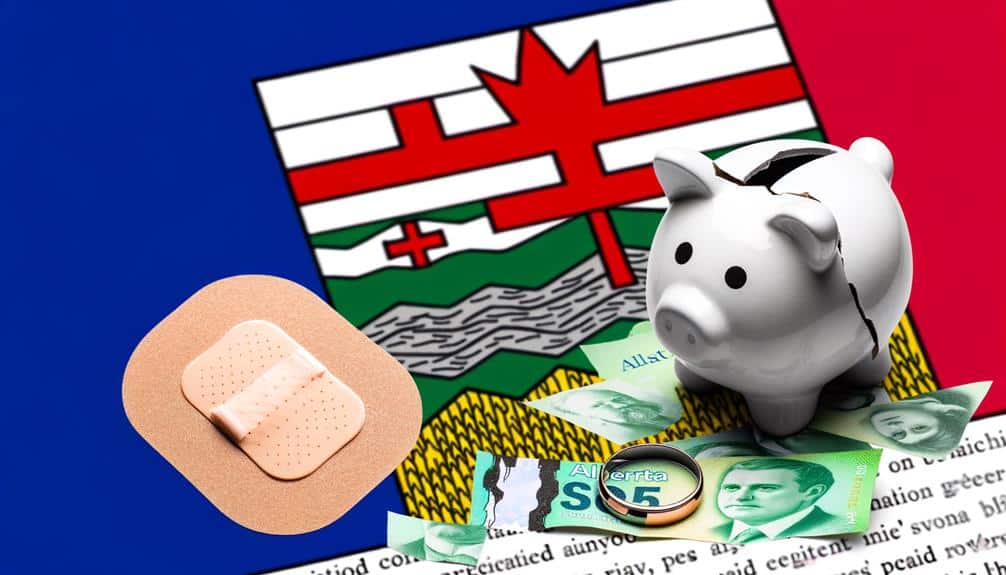
You may find yourself asking, does your ex-spouse have a right to a portion of your personal injury settlement in Alberta? While the question seems simple, the answer is woven with complex legal threads. In Alberta, whether an ex-spouse is entitled to a share of your personal injury settlement often depends on the timing of the settlement and the specific circumstances of the case. Factors such as the nature of the injury, the purpose of the settlement, and whether the funds were commingled during the marriage can all play a role in determining entitlement. Understanding legal nuances, such as the vexatious litigant meaning in Alberta, is also crucial, as it can affect how disputes around settlements or other legal actions are approached in family law matters.
Let’s unravel this together, discussing the legal intricacies and potential financial implications that lie beneath the surface of your settlement’s division in a divorce proceeding.
Key Takeaways
- Personal injury settlements are generally considered marital assets in Alberta and are subject to division in divorce proceedings.
- The Family Property Act provides exemptions for damages compensating individual loss, considering the value of the property at marriage or acquisition.
- Settlement breakdowns can lead to disputes in property division, emphasizing the importance of detailed evidence and legal advice.
- The impact of personal injury settlements on spousal support, future income loss, and tax implications should be thoroughly understood and managed.
Understanding the Matrimonial Property Act
To fully grasp the implications of your personal injury settlement on your divorce proceedings in Alberta, it’s crucial to understand the guidelines of the Family Property Act. This Act governs the division of property during divorce and has specific provisions about personal injury settlements.
The Act generally views personal injury settlements as marital assets, meaning they’re subject to division in a divorce. However, there are exceptions. If the settlement is awarded for a loss specific to one spouse, like pain and suffering or future income loss, it may be exempt from division. But remember, this exemption depends on the injury’s timing and the compensation’s purpose.
Determining the value of the property at the time of acquisition or marriage can also influence how the Act applies. If the settlement replaces income lost during the marriage, it may not be exempt.
The Act also provides specific guidelines under section 7(2) for determining exemption eligibility. Courts follow these guidelines to make a fair decision on property division. Understanding these nuances of the Family Property Act can help you confidently navigate your divorce proceedings.
Legal Considerations in Divorce Settlements
While understanding the Family Property Act is crucial, it’s also essential to grasp the broader legal considerations involved in divorce settlements, particularly when personal injury settlements are in play. In Alberta, you need to be aware that your personal injury settlement may be viewed as marital property, depending on several factors.
Firstly, the nature of the award is significant. If it’s compensation for pain and suffering, it’s generally exempt from marital property. However, if it compensates for loss of income during the marriage, it may be divided.
Secondly, the timing of the award matters. If you received it before the marriage, it’s usually considered separate property unless used for the benefit of both spouses.
Thirdly, the use of the funds is crucial. Funds used for joint purposes, such as paying off a mortgage, can be claimed as marital property.
Lastly, the court will consider the impact of the injury on your life. It may affect the settlement division if it’s led to additional costs or needs.
Division of Assets and Spousal Support
Navigating the division of assets and determining spousal support in a divorce can be complex, especially when a personal injury settlement is part of the marital assets. In Alberta, the Family Property Act stipulates the distribution of assets upon the dissolution of a marriage. This legislation encompasses all property acquired during the marriage, which may include personal injury settlements.
When it comes to personal injury settlements, it’s essential to understand that the Act differentiates between compensations. If the compensation is for a loss affecting both spouses, it will likely be included in the marital assets. However, if the compensation is for a loss unique to one spouse, it may be exempt.
Spousal support, or alimony, is another consideration. This is a payment made by one ex-spouse to the other after divorce, aiming to counterbalance any unfair economic effects. When determining spousal support, courts consider several factors, including each party’s financial means and the roles each person played during the marriage. If a personal injury settlement is part of the picture, it could affect calculating spousal support.
Financial Implications of Injury Settlements
Understanding the financial implications of personal injury settlements in a divorce is crucial, particularly when it comes to how these funds are used and how they may impact asset division and potential spousal support. In Alberta, the Family Property Act sets guidelines for handling these settlements. Realizing that these funds aren’t automatically exempt from division is essential.
If the settlement was awarded for a loss exclusive to you, such as pain and suffering, it might be considered exempt. However, if the funds were meant to replace lost income during the marriage, they could be classified as matrimonial property. This distinction can significantly influence the final division of assets and the calculation of spousal support.
Moreover, any part of the settlement used for joint expenses or benefits like mortgage payments or home improvements could be seen as matrimonial assets. On the other hand, if the settlement is used for individual expenses or debts, it might remain separate from the marital pool.
Lastly, remember that the tax implications of settlements can also influence divorce outcomes. Consulting with a tax professional and a divorce lawyer can help you navigate these complexities.
Handling Personal Injury Settlements in Divorce
When you’re dealing with a personal injury settlement in a divorce, it’s essential to have experienced legal guidance, and Spectrum Family Law can provide the support you need. Personal injury settlements are often considered marital assets in Canada. The division of these assets can be influenced by several factors, including the length of your marriage, your contributions, and your financial situation.
Courts assess the impact of the injury and any special needs or costs arising from it. You must understand the tax implications of your settlement, as this can affect the division of assets and spousal support. If your settlement funds were used for specific purposes like medical bills, this could influence how assets are divided.
Asset division can be resolved through negotiation or court proceedings in Canadian divorces. Judges aim for a fair division, considering any dependent children’s financial situation and needs. Spousal support may involve splitting personal injury settlements to provide support for a spouse in need. Settlement funds can affect how spousal support is determined. Agreements or arrangements between the parties are also taken into account. Always consult with a professional to navigate the complexities of your case.
Frequently Asked Questions
How Does the Duration of the Marriage Affect the Division of a Personal Injury Settlement in a Divorce?
The duration of your marriage can impact the division of a personal injury settlement in a divorce. The settlement could be considered marital property if the injury occurred during your marriage and affected your shared lifestyle.
However, it’s usually deemed personal if it’s linked to personal pain or future loss. It’s vital you consult a lawyer to clarify specifics, as laws vary in each province.
Can the Division of Personal Injury Settlements Be Adjusted if the Injured Spouse’s Condition Worsens After the Divorce?
In Alberta, adjusting the division of your personal injury settlement if your condition worsens post-divorce can be complex. It’ll depend on several factors, including your settlement and divorce agreement specifics.
However, it’s generally difficult to modify settlements after finalization. You should consult a legal professional to understand your options and potential outcomes. They’ll guide you through the process, ensuring your interests are protected.
Can a Spouse Claim a Portion of a Personal Injury Settlement if They Contributed to the Injured Spouse’s Care and Rehabilitation?
In Alberta, if you’ve cared for and contributed to your ex-spouse’s rehabilitation from an injury, you might be entitled to a portion of their personal injury settlement. However, it’s not a guarantee.
The court considers many factors, like the nature of the care provided and the financial situation of both parties.
It’s vital to consult with a professional to understand your legal rights and navigate this complex situation.
How Can a Spouse Protect Their Personal Injury Settlement From Being Considered a Marital Asset in a Divorce?
To protect your personal injury settlement from being considered a marital asset, you’ll need to demonstrate it compensates for your individual loss clearly. It’s important you maintain separate records and avoid commingling these funds with joint accounts.
Reach out to a skilled family lawyer to understand the nuances of the law and guide you through this process. Remember, the burden of proof lies on you to establish your settlement as exempt property.
If a Personal Injury Settlement Is Awarded After the Divorce, Can an Ex-Spouse Claim a Portion of It?
In Alberta, a personal injury settlement awarded after a divorce is generally considered separate property. However, exceptions can occur, especially if the settlement is for lost wages during the marriage or if the funds are used for joint benefits.
It’s crucial to consult a knowledgeable lawyer to navigate these complexities. Remember, the specifics of your case can greatly impact how this is handled.
Conclusion
Navigating the complexities of divorce and personal injury settlements can be daunting. However, armed with the right knowledge, you can safeguard your interests.
Remember, Alberta’s Family Property Act and other legal factors play a key role in determining the division of assets, including your personal injury settlement. Understanding the financial implications and how your settlement’s structure can impact the outcome is crucial.
Seek professional legal advice to ensure you’re making informed decisions.
References
Family Property Act, RSA 2000, c F-4.7
https://www.canlii.org/en/ab/laws/stat/rsa-2000-c-f-4.7/214898/rsa-2000-c-f-4.7.html
Williams v Williams, 2020 ABCA 15
https://www.canlii.org/en/ab/abca/doc/2020/2020abca15/2020abca15.html

We currently have three offices across Alberta — Edmonton, Calgary, and Red Deer. We serve the entire province of Alberta (and BC). We also have the infrastructure to work with any of our clients virtually — even the furthest regions of Alberta.
Call 1 (855) 892-0646 (toll free) to get routed to the best office for you or contact us online for general inquiries.
We also have a dedicated intake form to help you get the ball rolling. Our intake team will review your specific case and advise you on the next steps to take as well as what to expect moving forward. That’s the best way to schedule an appointment
Our offices are generally open 8:30 a.m.—4:30 p.m., Mon—Fri.


Harkeerat Singh
FAMILY LAWYER
Harkeerat is committed to providing personalized and effective legal solutions. He has handled all aspects of Family Law, including parenting, child support, spousal support, relocation, property division and child-related matters. He also has experience in Alternative Dispute Resolution including Mediation.
The Legal Review Process by Spectrum Family Law
- Spectrum strives for high-quality, legally verified content.
- Content is meticulously researched and reviewed by our legal writers/proofers (usually local law students).
- Details are sourced from trusted legal sources like the Family Law Act.
- Each article is edited for accuracy, clarity, and relevance.
- If you find any incorrect information or discrepancies in legal facts, we kindly ask that you contact us with a correction to ensure accuracy.


